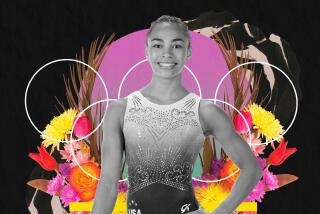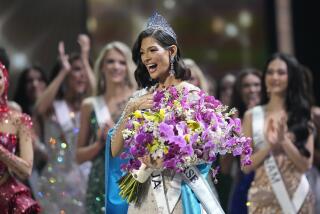Not a Winning Proposition
- Share via
HAVANA — The hair. You can’t help but notice. It cascades in braids, onto her shoulder blades, a beautiful black mop of it. And any time she laughs, which is often, she tilts back her head, the braids slapping together like curtains of bamboo.
The face also catches your eye, a look that has caught enough other island eyes that even she has to admit: “I do have a lot of people proposing me.”
Proposing?
“Propositioning me.”
There is plainly more to Ana Fidelia Quirot--kuh- ro-- than beauty. Yes, she has done some modeling, and at 28 craves the chance to do more, but the principal reason she has become the Florence Griffith Joyner of her country and of women’s track and field is by having won eight medals in four separate Pan American Games since 1979, including three in the current games.
Perhaps it was her striking appearance, or someone’s idle curiosity, or who-knows-what reason that prompted a somewhat peculiar question here Wednesday about why she and other Cuban men and women of darker complexions appeared to be competing in greater numbers, with greater success, than lighter-skinned Latino athletes.
Quirot’s response was equally peculiar, one that would cause more of a stir if uttered by an American.
After emphasizing that there is no racial discrimination in Cuba and that relations are good between people of all persuasions, Quirot said: “I think it goes with the genes in the black races that they are superior in some sports. Black and white athletes have the same chances to practice, but the black races are stronger. I think the blacks have better feet for sports.”
Better feet?
Why she thought so, she never said. Maybe something was lost in the translation. But this is someone who isn’t shy about saying what’s on her mind, and that is definitely what the woman said. So somebody better tell her a story about a Greek named Jimmy.
If not sooner, maybe this matter of Cuban heels will come up again in a couple of weeks at the world track meet in Tokyo, where Quirot will accelerate her training for Cuba’s first appearance in an Olympic Games since 1980. She cannot enter both of her specialty races, the 400 and 800 meters, in Japan unless the current timetable is altered, a semifinal heat in one event conflicting with the quarterfinal of the other. At Barcelona, however, she intends to run both.
After that, who knows? Maybe 1,500 meters.
“They should expect more victories and more records from Ana Fidelia Quirot,” quoth Quirot.
It runs in the family, as does she. Ana’s sister, Maria Moret, was a basketball player on the national team that played in the Moscow Olympics. Her brother, Francisco, ran the 400 meters. Her father was a boxer, she said, but “not a very good one.” And everybody in Cuba is acquainted with the man Ana was married to for eight years, and from whom she is now estranged, Raul Cascaret, the country’s first world champion wrestler, who was honored at a long civic ceremony just the other night.
Athletics is more than a part of her. Ask Ana what her interests are outside of sports, and her reply is: “None, so far.”
For the moment, she forgets modeling, forgets everything except her allegiance to her homeland, leaning forward now, braids swaying, saying: “I will be ready to serve the Revolution any way and at any time. If I am needed in another country, if they send me there, I’ll be there.”
Ana Fidelia is fiercely loyal to Fidel Castro, was named for him, even. She knows the whole rap by heart, how she would never betray her people for all the millions of dollars in the world, how when she needed a cyst removed it was done free of charge, how she has seen capitalist athletes go for professional gold, then “turn to begging” when their careers are through.
On legs as hard and taut as those on a piano, Quirot runs with astonishingly long strides for someone 5 feet 4. She overpowered the Pan Am field in the 400 and 800 here, same as she did in Indianapolis four years ago, and made up considerable ground before settling for second place in the 1,600-meter relay, same as she did in the Pan Am Games 12 years ago.
Altogether, Quirot has four golds, three silvers and a bronze, making her the queen of Cuban sport, from head to toe.
“How difficult is it,” a man asked, “for a woman to have a normal life when she dedicates her entire life to sport?”
“Well, maybe my dedication is not that absolute,” she replied. “What is your telephone number?”
More to Read
Go beyond the scoreboard
Get the latest on L.A.'s teams in the daily Sports Report newsletter.
You may occasionally receive promotional content from the Los Angeles Times.






